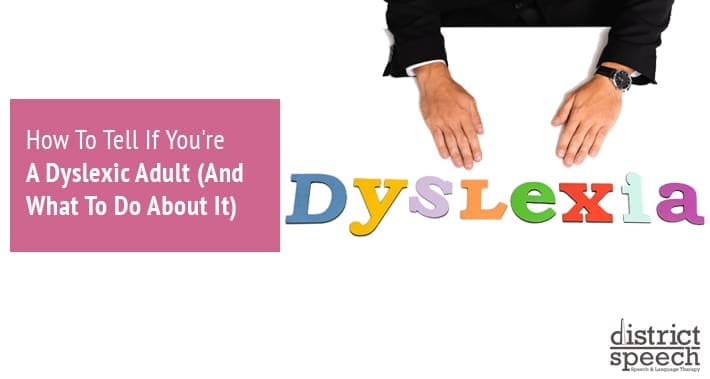
When we discuss language and learning disorders, children are often the primary focus.
Nonetheless, countless adults across the country are currently dealing with untreated language and learning disorders.
In fact, there are many cases of individuals who aren’t properly diagnosed with disorders such as dyslexia until they reach adulthood.
This lack of diagnosis may occur for a variety of reasons.
For instance, some dyslexic adults might work harder to compensate for their learning difficulties.
In these cases, childhood learning difficulties are often brushed off as laziness or being inattentiveness.
RELATED: Dispelling The Myths Around Dyslexia
This is especially true for children who aren’t displaying more typical signs of dyslexia, such as reversing letters or poor spelling.
RELATED: Spotting The Early Signs Of Speech And Language Disorders
Luckily, if you’re diagnosed with a learning disorder later in life, you can seek out speech therapy for dyslexia even as an adult.
As with all language and learning challenges, early intervention for dyslexia is important.
But that doesn’t mean that you can’t reap the benefits of speech teletherapy, or in person speech therapy, as an adult.
We’re District Speech, and we offer adult speech therapy in DC.
Today we’ll look closer at dyslexia, signs which can indicate its presence in adults, and ways in which speech therapy can help.
Keep reading to learn more.
What Is Dyslexia?
Dyslexia is a learning disorder which causes reading impairments.
People with dyslexia typically have trouble linking their speech sounds to letters and words, thus leading to multiple reading challenges.
Dyslexia is strictly an issue surrounding the areas of the brain which process language.
RELATED: Speech Therapy For Right Hemisphere Brain Damage
Therefore, it’s not linked to intelligence or vision issues.
Types Of Dyslexia
There are a few different types of dyslexia, each with their own set of symptoms and severity.
Let’s take a closer look at them.
Dysphonesia
Dysphonesia causes issues with auditory and listening skills.
It’s often referred to as “auditory dyslexia”.
People with this dyslexia subtype typically display average visual processing skills but struggle with remembering different word and letter sounds.
They may also have trouble pronouncing words they aren’t familiar with.
For example, they may blend sounds together when trying to pronounce unfamiliar words.
This form of dyslexia also causes impairments to your phonetic awareness.
In other words, people with dysphonesia struggle to match syllables to sounds.
Dysnemkinesia
Dysnemkinesia dyslexia causes challenges with symbol orientation.
People with this dyslexia subtype may struggle with letter and number formation while writing.
RELATED: Teaching Your Child To Write
For instance, they may write their letters backwards.
Motor skill impairments can also play a role in dysnemkinesia.
RELATED: Understanding Gross Motor Skills
Dyseidesia
People with dyseidesia have trouble understanding written words.
For this reason, it’s commonly referred to as “visual dyslexia” or “surface dyslexia”.
Dyseidesia frequently causes challenges surrounding visual processing.
For instance, someone with this dyslexia subtype might struggle to visualize letters and words and subsequently experience spelling challenges.
Common Traits Of Dyslexia In Adults
Adults with dyslexia often experience issues related to reading, math, time management, and memorization.
The symptoms of dyslexia affect everyone differently in various areas of life.
Next, we’ll take a closer look at some of them.
Career Challenges
Dyslexic adults commonly experience challenges in their professional lives.
These challenges often start even before employment is achieved.
According to a Harvard Business Review blogpost, three out of four dyslexic adults report hiding their diagnosis from potential employers during interviews.
Once hired, employees with dyslexia commonly experience a range of work related challenges, such as:
- Perfectionism and overreaction to mistakes
- Trouble with tests, such as tests to obtain certifications related to their profession
- Frustration with meetings to plan things, rather than just getting it done
- Difficulty staying on task for long periods, may prefer to jump from task to task
Reading and Writing Challenges
People with dyslexia experience reading challenges.
RELATED: How To Help Your Child Learn To Read
Some reading and writing traits common amongst dyslexic adults include:
- Distaste for public speaking or reading aloud
- Rereading sentences before understanding them
- Experiencing boredom easily while reading
- Poor handwriting
- Writing in all caps
RELATED: Understanding Fine Motor Skills
Behavior and Personality Challenges
Adults with dyslexia often display certain behavior and personality traits.
They may include:
- Being short tempered
- Becoming easily overwhelmed and stressed
- Being either extremely organized or disorganized
- Disliking tasks which involve learning new things, and preferring to stay in “comfort zone”
Time Management and Direction Challenges
People with dyslexia also commonly experience difficulty with their time management and directional skills.
Examples include:
- Having difficulty with directions, such as left and right or north, south, east, and west
- Difficulty reading maps
- Experiencing stress and anxiety while driving, especially in unfamiliar areas, and avoiding driving altogether if possible
- Needing to count on fingers for calculations
- Being frequently late due to losing track of time, or being very aware of time and rarely late
- Having trouble estimating how much time a task will take
RELATED: A Fun Way To Target “Following Directions” – With Help From Our Friends At The Speech Page!
Other Traits
Other dyslexic traits may include:
- Being empathetic and sensitive to the emotions of others
- Getting easily distracted
- Having strong intuition, and “street smarts”
- Enjoying video games
- Mispronouncing words without realizing it
- Having trouble remembering instructions when given verbally
- Being frequently accused of “not listening”

Speech Therapy Treatments For Dyslexia In Adults
Speech therapy for dyslexic adults differs from speech therapy treatments for dyslexia in kids.
At District Speech, our speech therapists are highly trained to help dyslexic adults in a number of ways.
Specific areas of concern, such as spelling, reading, or writing, are targeted through speech therapy.
Next, we’ll take a look at some of the specific ways a speech therapist can help.
1. Addressing Writing Concerns
Speech therapy approaches for addressing writing concerns try to simultaneously use process and product oriented techniques, wherever possible.
On the one hand, process oriented techniques focus on the processes used in writing, such as the development of ideas, organization, planning, and revision.
On the other, product oriented techniques target factors such as spelling, vocabulary, grammar, and effectiveness of communication.
Effective therapy plans for dyslexic adults uses a combination of both approaches.
2. Addressing Reading Concerns
Language and comprehensive approaches, as well as word structure approaches, can be utilized to help reading concerns.
The language comprehension approach works to close gaps due to factors such as unknown vocabulary, inability to make sense of words in context, and understanding of cohesive devices.
RELATED: How To Help Your Child Build Their Vocabulary
A word structure approach helps individuals with word decoding.
3. Addressing Spelling Concerns
The following are methods used to address issues related to spelling:
- Memorization exercises
- Multisensory approaches which use visual, auditory, and kinesthetic methods
- Phonemic awareness (auditory approach)
- Visual pattern awareness
- Tracing letters (kinesthetic approach)
Book Your Appointment With District Speech Today
Are you an adult who has been diagnosed with dyslexia later in life?
Is it impacting your ability to do tasks, both at home as well as at work, or preventing you from reaching your goals?
Or maybe you suspect you have undiagnosed dyslexia, and want to move forward with a proper diagnosis so you can access treatment options.
We’re District Speech, and we can help.
One of our speech language pathologists in Washington DC can help create a treatment plan for you to deal with your dyslexia.
Book your appointment with District Speech today to find out more about how we can work with you to find solutions for dyslexia.
1300 I St NW, #400E,
Washington, DC 20005
- https://g.page/districtspeech
District Speech and Language Therapy specializes in speech therapy, physical therapy, and occupational therapy solutions, for both children and adults, in the Washington D.C and the Arlington Virginia areas.